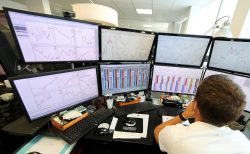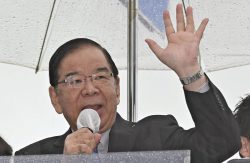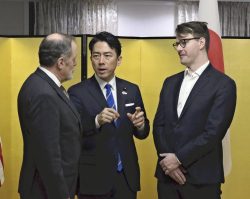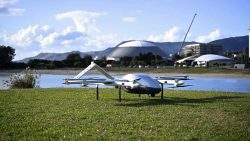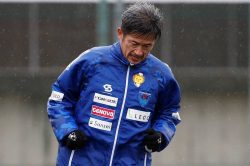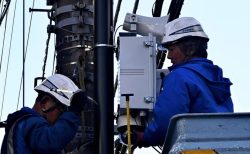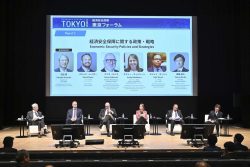
Photovoltaic power generators that Mazda Motor Corp. has installed on top of its plant in Hiroshima City
6:00 JST, June 16, 2022
Leading automakers are accelerating their efforts to achieve net-zero CO2 emissions at their plants much earlier than 2050, the target year advocated by the government.
Japan’s automakers need to move swiftly, as other countries are considering toughening regulations on imports of products from nations that have not done enough regarding decarbonization.
The reduction of CO2 emissions is being urged in various stages of production, including the manufacturing of parts and components, and automakers are taking a leading role in these decarbonization drives.
Target year of 2050
Mazda Motor Corp. announced on June 2 its commitment to achieving net-zero CO2 emissions in its factories around the world by 2035. In the painting process, for instance, the automaker will use colored film in place of paint, thereby cutting CO2 emissions by more than 50%. It will also utilize renewable energy, installing photovoltaic power generators on the roofs of its plants.
Mazda plans to achieve net-zero emissions in every process of vehicle production by 2050, including in the manufacturing by its parts suppliers.
Last year, Toyota Motor Corp. and Daihatsu Motor Co. moved forward their target year of achieving net-zero emissions in their factories to 2035 from 2050.
Besides utilizing a painting technique similar to the one Mazda plans to use, both automakers aim to realize in-house transportation that harnesses natural power such as the force of gravity and toothed gearing, without using such motive power as electricity. The two automakers will also move ahead with the use of renewable energy, and carbon trade to buy credits that permit them to emit a certain amount of CO2 or other greenhouse gases that are cut by other companies or local governments.
Export restrictions
Automakers are seeking through these efforts to promote similar steps by their parts suppliers.
There are concerns that exports of their vehicles could be restricted. To avoid this, they need to sell electric vehicles that are CO2 emission-free while running, and also promote decarbonization efforts throughout the production process, including manufacturing and transport.
In particular, the European Union is considering introducing a Carbon Border Adjustment Mechanism, which would put a carbon price on imports from countries where measures to prevent global warming have not been sufficient.
If auto parts makers emit a large amount of CO2 during production, or they have not sufficiently adopted the use of renewable energy, products using their parts may become subject to restrictions.
According to estimates by Mazda, the total amount of CO2 emitted in the production process of EVs, including their parts supply chains, is two to three times that emitted in the production of gasoline-powered vehicles.
“If automobiles that emit a large amount of CO2 in the production process cannot be exported, about 1 million jobs could be lost in Japan,” an official in charge of public relations at the Japan Automobile Manufacturers Association warned.
Cost burden
Cost is a significant hurdle to achieving net-zero emissions.
Large investments will be needed for new technologies and equipment designed to reduce CO2 at factories, constituting a heavy burden for small and midsize parts and components manufacturers.
“If the cost of decarbonization efforts balloons, it will push up the prices of products and reduce their competitiveness,” said Seiji Sugiura, a senior analyst at Tokai Tokyo Research Institute Co.
"Business" POPULAR ARTICLE
-

Japan Govt Adopts Measures to Curb Mega Solar Power Plant Projects Amid Environmental Concerns
-
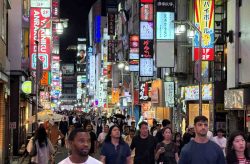
Core Inflation in Tokyo Slows in December but Stays above BOJ Target
-

Major Japan Firms’ Average Winter Bonus Tops ¥1 Mil.
-

Bank of Japan Considered U.S. Tariffs, Coming Shunto Wage Hike Talks in Its Decision to Raise Interest Rates
-

Institute: 2026 Condo Supply in Tokyo Metropolitan Area Forecast to Increase by 2.2%
JN ACCESS RANKING
-

Japan Govt Adopts Measures to Curb Mega Solar Power Plant Projects Amid Environmental Concerns
-

Core Inflation in Tokyo Slows in December but Stays above BOJ Target
-

Major Japan Firms’ Average Winter Bonus Tops ¥1 Mil.
-

Bank of Japan Considered U.S. Tariffs, Coming Shunto Wage Hike Talks in Its Decision to Raise Interest Rates
-

Tokyo Zoo Wolf Believed to Have Used Vegetation Growing on Wall to Climb, Escape; Animal Living Happily after Recapture




